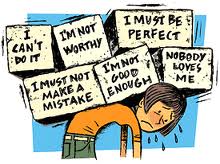 We all have an inner critic that tells us from time to time things like, “You should’ve known better. You are such an idiot. You did it again, what is wrong with you. C’mon, you can do better than that.” For perfectionists this inner critic can be unrelenting—constantly telling us that if only we would have worked a little harder or had been more careful things would have turned out better—basically making us feel like we just don’t measure up. It is not uncommon for people to have a harsh inner critic. This inner critic, if left to run amuck in our minds, will often produce feelings of shame, self-doubt, inferiority, low self-esteem, and depression. So, what are we to do with this voice? Ignoring the inner critic has not proven to be a very effective method. Trying to strong-arm it and beat it into submission seems to only cause the voice to get louder and more insistent. But we can turn down the volume on our inner critic. We can even learn how to see our inner critic as an ally rather than an enemy. Here are four tried-and-true techniques that can help: 1) Understand the Inner Critic’s Role: It is helpful to recognize that the inner critic is usually coming from a place of protection. The voice is a survival mechanism helping make sure you don’t go getting yourself into trouble by taking crazy risks or making major mistakes. The role of the inner critic is important to your survival, believe it or not. While you may become annoyed, even paralyzed at times with the messages you hear, the voice is committed to your well-being. So even though its attempts to protect you may sometimes be misguided, it can be considered a well-intentioned ally. 2) Discernment is a Critical Key: We get into trouble with our inner critic when we don’t recognize that the advice we are getting is often inaccurate. When we understand the critic’s role—that it’s trying to keep us safe like an overbearing, well-meaning mother—we can be more discerning with the content within the warning. As soon as you hear the critic’s voice, ask yourself, “Is my inner critic helping me here or hurting me with this advice?” We can reason with the voice once we understand that it does not speak absolute truth. For example, we can say, “I understand that you are trying to protect me and I appreciate that, but this advice does not really apply here. I have thought this through and it feels like I’m making the right move. I’ll course correct if things get out of control.” Also, if what you are hearing hinders your energy and confidence, ask the voice to step aside and continue on your way. Sometimes it is helpful to engage the voice and ask, “What’s the wisdom in the counsel? What might I be missing?” The strategy here is to be more objective with the advice you are getting so you can choose how to work with the inner critic, rather than being ruled by it. 3) Acceptance Leads to Freedom: A good rule of thumb to follow is to realize that the inner critic isn’t going anywhere—it’s likely here for the long haul. Besides, efforts to try to ignore the critic, banish it to the basement, or beat it away, only end in frustration. This futile cycle of trying to defeat the voice only leads to more self-criticism for not being able to win at this game. Instead of trying to defeat the voice, try the tact of acceptance. With acceptance we become more relaxed and comfortable with the inner critic, recognizing it is a part of us, even a useful part at times. With acceptance we allow ourselves to become friends, getting to know this voice intimately. As you make this transition to acceptance you will probably find that the voice becomes less harsh and caustic over time. 4) Investigate the Origin of Your Inner Critic: All inner critics are not alike and just like us, their behavior can change over time. Some people have an inner critic that is very harsh and unrelenting. Others may have one that sounds like a loving but paranoid parent. Some critics are loud and frequent, while others are more gentle and subtle. Understanding the origin of your inner critic can be very helpful in learning how best to deal with it. If you are wondering how to determine the origin of your inner critic, the best advice I can give is ask—simply ask that voice, “Where do you come from?” and listen to what you hear back. For most people, their inner critic can be traced back to their childhood, often born out of their interaction with their parents or other influential adults who may have been hard to please. But not all inner critics come from our childhood. We’re influenced by many different factors, including competition with our peers, societal pressures, the media, our intimate relationships, and our own attitudes about winning and losing. Once you understand where your inner critic originated from, you’ll be in a better position to recognize when it’s providing good wisdom or dishing out unhelpful criticism. These four techniques that we reviewed can help you interact more effectively with your inner critic and turn it into a powerful ally rather than a destructive combatant. (Excerpt from my new book Thriving in Turbulent Times)
3 Comments
Janet
10/13/2014 03:00:01 am
I really liked this post. Helpful tips that I look forward to trying. Thank you!
Reply
Robert L.
10/14/2014 07:33:10 am
I have struggled most of my life with a strong (negative) inner critic. These are some of the best suggestions I have come across to help battle that inner voice. Love reading your blog posts.
Reply
Darren D.
11/17/2014 04:44:48 am
Great suggestions for befriending the inner critic. Kind of like having a judo approach rather than boxing.
Reply
Leave a Reply. |
AuthorJohn's passion is in helping people get unstuck so they can experience their true potential. Before starting his own practice he spent 16 years coaching, consulting, and presenting to Fortune 500 companies, teams, and individuals on how to breakthrough their barriers and magnify their talents. Archives
September 2015
Categories
All
|


 RSS Feed
RSS Feed
